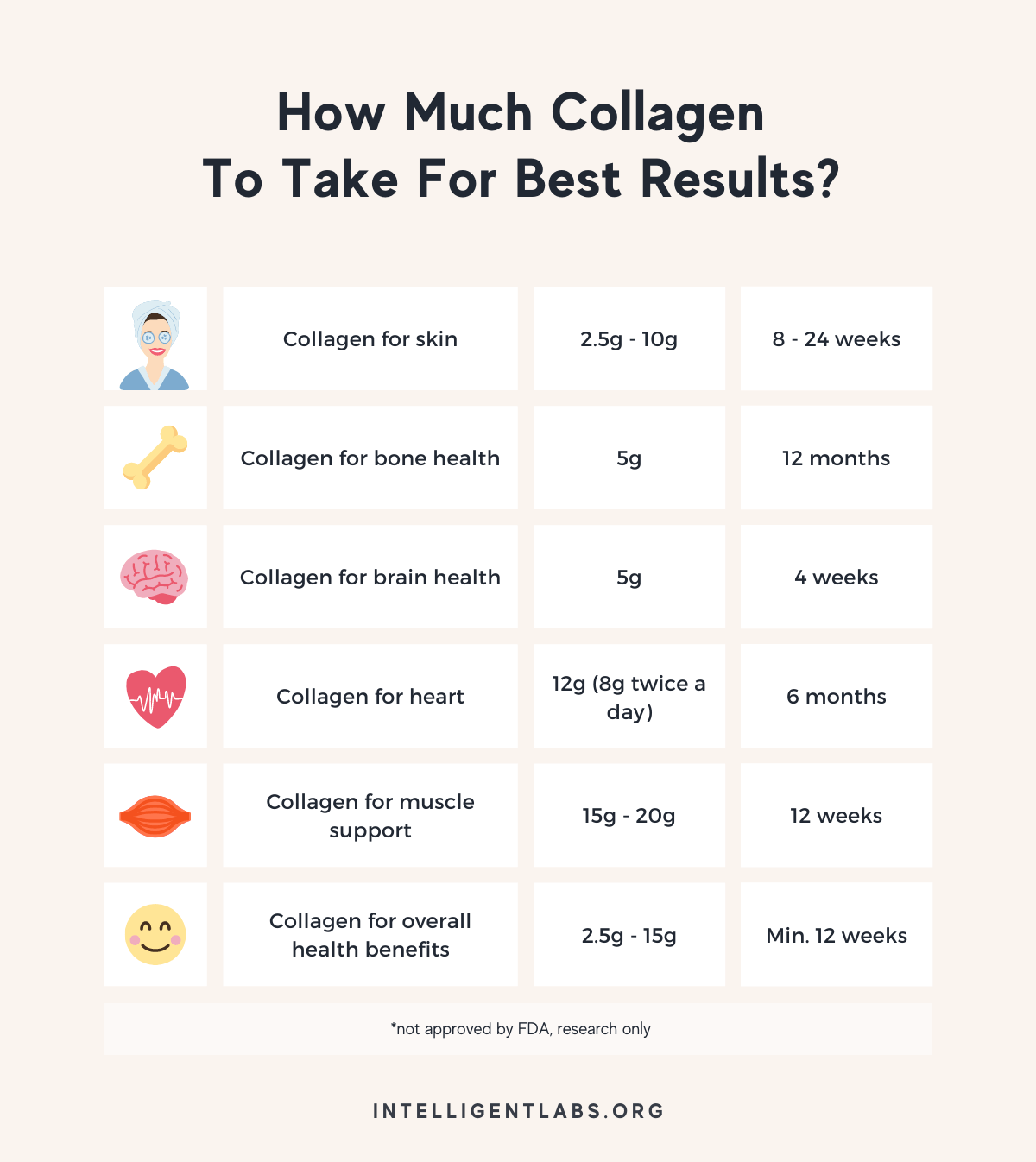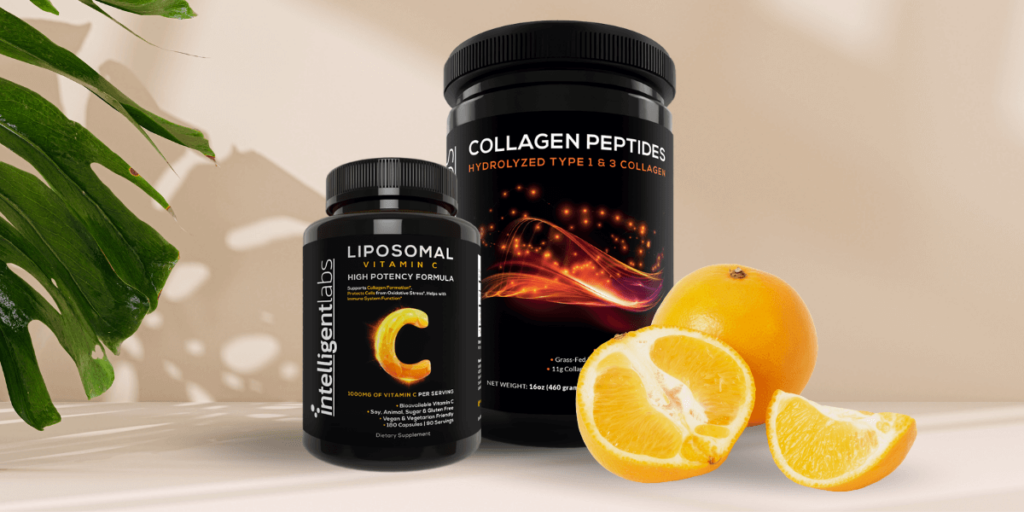Both collagen and vitamin C are well-known heavyweights in the health and beauty industries, with scientific research supporting many of their purported benefits. But what happens if you take both of them together? Is it even safe to do so? Let’s find out in this blog post!
Table of Contents
First, let’s define these two nutrients and where we can get them…
What is collagen?
Collagen is the body’s most abundant structural protein. While there are about 28 different types, types I, II, and III collagen account for up to 90% of total collagen in the body. Collagen helps build and maintain our skin, hair, nails, bones, tendons, muscles, ligaments, cartilage, blood vessels, and more.1
Food sources of collagen are limited to animal food products, such as skin, meat, tendons, and ligaments. But if you’re looking to really up your collagen game, consider making bone broth as bones are a rich source of collagen.
Alternatively, taking supplements such as our Intelligent Labs Collagen Powder is also a great idea. We use hydrolyzed collagen, aka collagen peptides, in our product. This is the bioactive form of collagen. It’s easily absorbed and needs no further conversions in the body.
What is vitamin C?
Vitamin C is one of the essential nutrients that we need for optimal health. Unlike collagen, which the body naturally produces, we must obtain vitamin C from either food or supplements. The body doesn’t store it, making regular intake important.
Food sources are quite plentiful. Vitamin C is found in fruits and vegetables and organ meat like the liver and kidney. Additionally, vitamin C or ascorbic acid supplements are also quite common. However, these usually have poor absorption rates, so most of what you take ends up in the toilet when you pee.
We recommend taking our very own Intelligent Labs Liposomal Vitamin C instead. We formulated this product to boost vitamin C’s absorption rates, allowing you to enjoy all the benefits this nutrient offers!
What happens if you take collagen with vitamin C?
A lot, actually! And it all boils down to the fact that vitamin C is a co-factor in collagen formation. This means that without vitamin C, there’s no collagen as well.

Taking collagen with vitamin C isn’t just an option but a requirement. And this becomes even more of a MUST the older you get. Why? Because the body’s collagen production starts declining once we hit our 20s. This explains the appearance of fine lines and wrinkles around this age.
As the years go by, the signs of aging become even more pronounced; these are also correlated to low collagen levels. Joint pain starts becoming a regular occurrence. While collagen supplements aren’t exactly marketed for their joint health benefits, they do make quite an impact. In fact, several studies do support collagen’s positive effects on joint health.
Fortunately, taking a high-quality collagen supplement together with vitamin C can help slow down the ticking hands of time. Unfortunately, there’s no way to stop time, but it’s certainly possible to look younger than your age! But here’s the trick: you must know when to take collagen powder (hint: the earlier, the better).
The benefits of taking collagen with vitamin C
We’ve discussed many of the associated health benefits of taking collagen in our Ultimate Guide to Collagen. But the table below should give you a fair idea of what may happen if you take collagen with vitamin C:
| Body part | How collagen + vitamin C can help |
| Skin | Reduces wrinkles, less skin dryness, stronger and more radiant skin |
| Hair | Promotes hair growth, healthier follicles, prevents thinning, slows down graying |
| Nails | Improves nail thickness and prevents brittleness, boosts nail growth |
| Eyes | Improves eyesight, helps eyes stay young, prevents ocular diseases |
| Bones | Reverses bone loss, increases bone density, strong bones and joints, more flexibility |
| Teeth and gums | Strengthens teeth enamel, prevents cavity and decay, heals mouth ulcers, prevents tooth loss |
| Internal organs | Improves gut health, heart health, protects against brain disease |
| Muscles | Faster recovery after exercise, reduces sports injuries, boosts muscle mass |
| Appearance | Look younger than your age, be healthier, feel more confidently beautiful! |
Is it safe to combine both collagen and vitamin C?
Short answer, yes. Both products are safe to take individually or together. For collagen, a daily dose of up to 15g is considered safe.2 For vitamin C, there is an established tolerable upper limit of 2000mg per day.3
A 2018 review of 10 studies also supported the safety of these supplements. Researchers studied the effects of vitamin C on collagen synthesis after an injury. They found no adverse effects on animal and human subjects.4
How much collagen and vitamin C to take for best results?
We would recommend following the serving size printed on the product label:
For our Collagen Peptides, a single scoop contains 11g of both types I and III collagen. You may take one scoop daily. Or, for best results, you may opt to take it twice daily.
For our Liposomal Vitamin C, each capsule contains 500mg of bioactive vitamin C. The suggested dosage is 2 capsules, one in the morning and another in the evening.
Here’s a graphic showing how much collagen to take to enjoy specific health benefits:

Conclusion
Taking collagen with vitamin C is a must to help raise your body’s collagen levels. Both supplements help with skincare and enhance physical appearance. But their impact on overall health is more than just skin-deep. For best results, use the bioavailable forms of these two products. Choose our Collagen Peptides and Liposomal Vitamin C supplements!
References:
- Shoulders MD, Raines RT. Collagen structure and stability. Annu Rev Biochem. 2009;78:929-958. ↩︎
- Significant Amounts of Functional Collagen Peptides Can Be Incorporated in the Diet While Maintaining Indispensable Amino Acid Balance, Cristiana Paul, Suzane Leser and Steffen Oesser, Nutrients 2019, 11(5), 1079 ↩︎
- Vitamin C Fact Sheet for Health Professionals, taken from National Institutes of Health: https://ods.od.nih.gov/factsheets/VitaminC-HealthProfessional/ ↩︎
- DePhillipo, Nicholas N., et al. “Efficacy of Vitamin c Supplementation on Collagen Synthesis and Oxidative Stress after Musculoskeletal Injuries: A Systematic Review.” Orthopaedic Journal of Sports Medicine, vol. 6, no. 10, Oct. 2018, p. 232596711880454, https://doi.org/10.1177/2325967118804544. ↩︎




